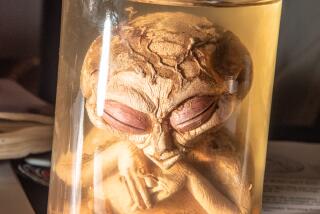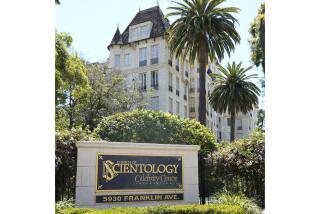Life after Scientology is contentious for church leader’s father

Ronald Miscavige, father of Scientology leader David Miscavige is being followed by private eyes after leaving the church.
After leaving the Church of Scientology and its secretive international base in the desert, Ronald Miscavige Sr. settled into small-town life in Wisconsin, his 40-year ties to the religion cut once and for all.
Or so he thought, as he spent his time hawking exercise equipment online and playing trumpet with Dixieland bands in the Milwaukee area. His suburban tranquility was shattered in July 2013, when police told him that two private eyes had been watching his every move for months — and that the church, led by his son David Miscavige, was behind it.
“I don’t know if you’ve ever hit your thumb with a hammer, but when it happens you go numb: It takes a little while for the pain to set in,” the elder Miscavige said in an interview. “I thought, ‘You have got to be kidding.’ ”
Miscavige, 80, has chronicled his life before, during and after Scientology in a book, “Ruthless: Scientology, My Son David Miscavige and Me.” It paints an unflattering portrait of his son and the church, and it echoes the views of other disaffected ex-members.
“David runs Scientology with an iron fist and, to my mind, it has become a cult, pure and simple,” he writes.
Miscavige’s book includes no blockbuster revelations, but it has evoked an unusually vehement response from the church, which has mounted an aggressively negative publicity campaign, including a website dedicated to discrediting him.
Dozens of testimonials and blog posts by Scientologists praise David Miscavige and lambaste his father for everything from his musicianship to his morals. He is cast as a liar and an opportunist, on the website and in a church lawyer’s letter to The Times.
“That is a father who is a despicable human being, simply trying to make a buck off of the good name, fame and kindness of his son,” attorney Monique Yingling wrote.
Peter Schless, a longtime Scientologist and composer who worked with Ron Miscavige, used some of the same language in a 12-minute video that castigated him as “vile and disgusting.”
“I know him inside out and that’s all he’s doing is he’s figured out a way to make a buck off of selling out his own family,” Schless said in the video.
Miscavige said he expected the intensely personal criticism posted on the website.
“Clearly, all it is is a character assassination of me,” he said.
Other ex-members say the website is yet another example of the church’s longstanding efforts to dissuade current and former Scientologists from publicly discussing their experiences.
Ron Miscavige has been singled out for particularly harsh treatment because of his relationship to David, said Mike Rinder, once a top church official and now one of its staunchest critics. He said the elder Miscavige also has been targeted by an email campaign and negative online ads.
“This is stuff that is even beyond the normal smear tactics,” Rinder said.
Even if I can’t help myself, maybe I can help hundreds of others forced to disconnect.
— Ronald Miscavige Sr.
::
Founded in 1954 by science-fiction writer L. Ron Hubbard, Scientology has its own “study technology,” vocabulary and long-held secret story of Xenu, a soul-stealing galactic overlord. The church teaches that spiritual freedom — the state of “clear” — can be reached through one-on-one auditing, a form of counseling aided by a polygraph-like device called an e-meter and expensive training courses.
David Miscavige, 56, became the head of Scientology after Hubbard’s death in 1986. As chairman of the board of the Religious Technology Center, he is the church’s ultimate authority and its ecclesiastical leader. He also is its most controversial living figure.
Ex-members, including Rinder and other top officials who told their stories to the St. Petersburg Times in 2009, have accused him of physical assaults and bizarre behavior — all of which he and the church deny.
His father’s book details the family’s history, some of it fondly remembered, some of it anything but heartwarming. Among other things, he writes about his sometimes abusive relationship with his late first wife, Loretta, the mother of his children.
“It pains me to admit it now, and I regret ever doing it, but there were times when I punched Loretta,” he writes. “I never slapped or hit her in the face but, still, sometimes I did strike her. ... She threw things at me — pots, pans, a pot of boiling water once.”
Miscavige said he regrets that his children witnessed the domestic violence and thinks it might have affected David’s personality.
“When I compare the happy, fun-loving boy I raised to the man he has become, the images of Dr. Jekyll and Mr. Hyde spring immediately to mind,” he writes.
David and his three siblings were introduced to Scientology by their father, a musician and cookware salesman. At age 16 he left their home near Philadelphia to join the Sea Organization, Hubbard’s religious order.
Years later, in 1985, Ron Miscavige was accused of an attempted rape. He denied the allegation and, after his son sent lawyers to defend him, the charges eventually were dismissed, according to the memoir and the church website.
Soon after, the elder Miscavige also joined the Sea Organization and he and his wife divorced. He spent 27 years at the sprawling “Gold Base” near Hemet, where Golden Era Productions makes videos, audio recordings and e-meters. Miscavige played trumpet in the Golden Era band.
He and other ex-Scientologists describe long hours and low pay for “Sea Org” members there and demeaning punishments, including stints in “the Hole,” for those who upset David.
“It’s a dark world,” Miscavige said. “It’s a grim existence, buddy.”
::
In March 2012, Miscavige and his second wife, Becky, drove off the base while pretending to run errands, and eventually wound up in Wisconsin.
Life there was unremarkable until July 2013, when West Allis police arrested private investigator Dwayne Powell on obstruction and prowling charges and found firearms and a homemade silencer in his rented SUV.
For more than a year, Powell told detectives, he and his son had followed Miscavige, eavesdropped on him and spied on his emails. They were paid $10,000 a week through an intermediary, he told police, explaining that David Miscavige was the “main client.”
On one outing, Powell told police, he saw Ron Miscavige clutch his chest while loading his car and thought he was having a heart attack. He called his go-between for instructions, and minutes later a man who identified himself as David Miscavige called back and told him that “if it was Ron’s time to die, to let him die and not intervene in any way,” a police report states.
Scientology attorneys dispute that account and last year said that David Miscavige had never spoken with Powell and had no connection to the surveillance of his father. They noted that they sometimes retained private investigators in “matters related to litigation” and have since acknowledged hiring Powell.
Church attorney Yingling said in her letter to The Times that he was hired to follow the elder Miscavige but that it was for his own well-being and “out of concern that people with hostile intentions toward Scientology” would harass him.
“It would be naive to think that the father of the leader of a worldwide religion would not be at risk of harm from people inimical to Scientology,” she wrote.
Yingling also forwarded a signed declaration from Powell, recanting his statements to police about the phone call from David Miscavige.
“Certain statements I allegedly made to the West Allis Police Department have been misinterpreted,” it read in part.
Police in that Milwaukee suburb stand by their account: “There is no confusion in the statements that were made by Dwayne and Daniel Powell,” Chief Patrick Mitchell said in an email.
Now, in the latest twist in the saga of church-sanctioned surveillance, Powell says he was paid thousands of dollars to sign the declaration after church attorneys summoned him to a meeting last year in Atlanta.
“The whole meeting took less than 10 minutes,” he said. “They said, ‘This is what this is, and this is what it’s for. Goodbye and good luck.’ ”
He furnished no documentation, and Scientology attorneys deny that any such payment was made.
But other records obtained by The Times show that Scientology lawyers, who had publicly sought to distance the church from Powell, kept him on the payroll two years after his arrest — and long after he stopped conducting investigations.
In the spring of 2015, just weeks before Powell signed the declaration, a Scientology attorney paid him at least $16,000 for “security” services in five payments, according to check stubs obtained by The Times. The checks were written on the trust account of Kendrick Moxon, a prominent Scientology attorney in Los Angeles, the records show.
Reached by phone, Powell confirmed the payments but would not comment on them.
But he did say that he had not worked for the church after giving up his Florida private investigator’s license in 2014, when he was indicted on a federal charge of possessing an illegal silencer. It was dismissed when he entered a pretrial diversion program.
Moxon told The Times in a written response that Powell performed “security and research services” for his firm last year.
“The relationship between this firm and any investigators I retain is privileged and confidential,” he wrote. “However, I can categorically state for the record that no payments were made to Mr. Powell for the testimony in his truthful declaration.”
::
Ron Miscavige spent much of his summer promoting his book. He said he wrote it because his son and the church, through a form of shunning called “disconnection,” had turned his family against him.
“Someone has to stand their ground and take a position,” he said. “Even if I can’t help myself, maybe I can help hundreds of others forced to disconnect.”
In response, the church has posted a joint statement by his two adult daughters accusing him of “a pattern of physical and emotional abuse” against them and their late mother.
“We know what is right and moral, and what is evil,” they wrote. “Evil is Ronald T. Miscavige. We reject him.”
Miscavige said he was surprised and hurt by their statement. On his 70th birthday, he said, they and David bought him a car; on his 75th they showered him with 75 gifts. Everything was fine, he said, until he spoke out against the church.
“Now all of a sudden I’ve changed into this beast?” he said.
Miscavige said he hopes his story will help “reform” Scientology. He also hopes to someday reconcile with his son.
“I will always hold that hope in my heart,” he said. “Would I put much money on it? No.”
ALSO:
Father’s memoir spurs Scientology leader David Miscavige to threaten lawsuit
Leah Remini gets emotional about Katie Holmes in interview on Scientology
Hulu’s provocative new series ‘Path’ focuses on a cult-like faith, but it’s not Scientology
More to Read
Sign up for Essential California
The most important California stories and recommendations in your inbox every morning.
You may occasionally receive promotional content from the Los Angeles Times.











